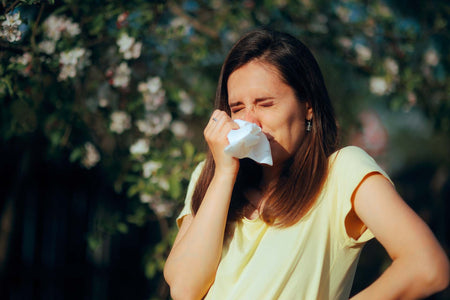- Seasonal allergies are generally caused by tree pollen in spring, grass pollen in late spring to summer, and ragweed pollen in late summer to fall, as well as mold that thrives in high humidity.
- Symptoms can vary in severity and may include nasal congestion, sneezing, runny nose, itchy or watery eyes, and fatigue.
- Treatment options include antihistamines, nasal sprays, and immunotherapy for long-term relief.
Many people experience allergies during certain seasons, like spring or fall. Commonly known as hay fever, seasonal allergies are triggered by pollen from trees, grass, and weeds. In this article, we'll explore the causes of seasonal allergies, their symptoms, and the best ways to manage and prevent them.
What are Seasonal Allergies?
Seasonal allergies are an overreaction of the immune system to airborne allergens that are prevalent during spring, summer, and fall. These allergens trigger the release of histamine in the body, which causes symptoms like sneezing, congestion, and itchy eyes.
Note that seasonal allergies are less common in winter. This is because winter is associated with lower pollen levels, which is a primary trigger for seasonal allergies. However, indoor allergens like dust mites , pet dander, and mold can still cause symptoms during winter.
Common Causes of Seasonal Allergies
Airborne allergens that vary depending on the time of year primarily cause seasonal allergies. Here are the specific triggers:
Tree Pollen
Tree pollen is a fine, powdery substance released by male trees as part of their reproductive process. It usually appears in the spring. In many areas, tree pollen season starts in March and can last through May.
The timing can vary based on local climate and the trees present. Common trees that produce pollen include oak, birch, maple, and cedar. This pollen can cause significant allergy symptoms in sensitive individuals [*].
Grass Pollen
Grass plants produce grass pollen for reproduction. It usually appears from late spring to summer. In many areas, grass pollen season starts in late May or early June and can continue until August. However, note that it may occur year round in warmer parts of the country [*].
Common grasses that produce allergenic pollen include Bermuda grass, Timothy grass, and Orchard. People consider these to be "very allergenic."
Related: Grass Rash: Causes, Symptoms, and Treatment
Ragweed
Ragweed is a flowering plant in the Asteraceae family. These weeds produce a lot of pollen that can cause seasonal allergies — up to 1 billion pollen grains per ragweed plant [*]. Growing wild almost everywhere (in fields, roadsides, and other disturbed areas), their pollen usually appears from late summer to fall.
In many areas, ragweed pollen season starts in August and continues until the first frost, around October. The pollen is lightweight and can travel long distances, which makes it a major allergen for many people.
Mold
Mold is a type of fungus that grows in structures called hyphae. It produces tiny, lightweight spores that can become airborne and settle on surfaces.
Although mold can occur year-round but is more common in late summer and fall when humidity and moisture levels are higher. Indoor mold can also be a problem in winter if homes are poorly ventilated and indoor humidity levels are high.
Seasonal Allergies Symptoms
Seasonal allergies can cause a variety of symptoms, including:
- Nasal congestion
- Frequent sneezing
- Runny or stuffy nose
- Itchy or watery eyes
- Itchy throat
- Coughing
- Fatigue
These symptoms typically occur when a person is exposed to specific seasonal allergens like pollen, and they can vary in severity depending on the individual and the allergen involved.
Seasonal Allergies Treatment
There are various treatments for seasonal allergies, and a doctor can help determine the best approach based on the severity of your symptoms and your specific triggers.
Common over-the-counter (OTC) and prescription treatments include:
Antihistamines
Antihistamines work by blocking histamine, a chemical your body releases in response to allergens, which helps relieve common allergy symptoms like sneezing, nasal congestion, itchy eyes, and throat irritation.
They are a common treatment for managing seasonal allergies and come in both drowsy and non-drowsy options.
First-generation antihistamines like diphenhydramine and chlorpheniramine are effective but can cause drowsiness and may affect concentration.
On the other hand, second-generation antihistamines are newer. Since they cause less sedation, people can take second-generation antihistamines during the day. Examples are cetirizine, loratadine, and fexofenadine [*].
Nasal Sprays
Nasal sprays help treat seasonal allergies by delivering medication directly to the nasal passages. This allows the medication to work locally and relieve symptoms.
These are the different nasal sprays:
- Corticosteroid nasal sprays reduce inflammation in the nasal lining, which helps with congestion, sneezing, and a runny nose.
- Antihistamine nasal sprays block histamine in the nasal passages, providing quick relief from itching and sneezing.
- Saline nasal sprays flush out allergens and mucus, keeping the nasal passages moist and clear.
Combination sprays, like those from Allermi, offer a personalized approach by incorporating active ingredients in one spray to target multiple symptoms. Allermi includes an antihistamine, decongestant, anti-inflammatory, and anti-discharge.
Immunotherapy
Immunotherapy helps reduce your sensitivity to allergens by gradually introducing small amounts of the allergen to your body. This can be done with allergy shots (injections) or by placing tablets or drops under your tongue.
As your immune system gets used to the allergen, it reacts less strongly, which means fewer allergy symptoms. Unlike other treatments that only manage symptoms, immunotherapy actually changes how your body responds to allergens. It can offer long-term relief even after the treatment ends.
Related: What to Do When Allergy Medicine Doesn't Work?
Preventing Seasonal Allergies
This involves several strategies to minimize exposure to allergens and reduce symptoms. Here are some effective approaches:
- Monitor pollen counts. Check local pollen forecasts and stay indoors on days with high pollen levels or during peak pollen times. This usually happens early morning and late afternoon.
- Keep windows closed. During high pollen seasons, keep windows closed in your home and car to prevent pollen from entering. Occasionally, if the pollen count is low, you can open windows for fresh air, but check local pollen forecasts first.
- Use air purifiers. Install air purifiers with HEPA filters in your home to reduce indoor allergens like pollen, dust, and mold.
- Clean regularly. Frequently clean your home to remove dust and mold. Wash bedding and rugs regularly in hot water to eliminate allergens.
- Shower and change clothes. After spending time outdoors, shower and change clothes to remove pollen from your skin and hair.
- Manage indoor humidity. Use a dehumidifier to control indoor humidity levels and prevent mold growth. It's recommended to keep indoor humidity levels between 30% and 50%.
- Avoid outdoor activities during peak pollen times. Try to limit outdoor activities on high pollen days, especially in grassy or wooded areas.
Remember to take these preventive measures so you can reduce your exposure to allergens and better manage seasonal allergy symptoms.
Related: Spring Cleaning Checklist
When to See a Doctor for Seasonal Allergies
You should see a doctor if your allergy symptoms are severe, persistent, or not controlled by over-the-counter treatments. A doctor can provide an accurate diagnosis, recommend stronger medications or allergy tests, and discuss long-term management options.
The Bottom Line
As you have learned, there are effective solutions available to help you manage your seasonal allergy symptoms. The key is to know your triggers and explore a variety of treatment options — from antihistamines and nasal sprays to immunotherapy.
Finding the right approach can provide you with the relief you need. However, if you continue to struggle with persistent symptoms, reach out to a healthcare professional for guidance.
References:
- MSD Manuals. (n.d.). Seasonal allergies. Retrieved September 23, 2024, from https://www.msdmanuals.com/home/immune-disorders/allergic-reactions-and-other-hypersensitivity-disorders/seasonal-allergies
- Asthma and Allergy Foundation of America. (n.d.). Grass pollen allergy. Retrieved September 23, 2024, from https://aafa.org/allergies/types-of-allergies/pollen-allergy/grass-pollen-allergy/
- Asthma and Allergy Foundation of America. (n.d.). Grass pollen allergy. Retrieved September 23, 2024, from https://aafa.org/allergies/types-of-allergies/pollen-allergy/grass-pollen-allergy/
- Clinic, C. (2024). Antihistamine Types & Side Effects. Cleveland Clinic. https://my.clevelandclinic.org/health/treatments/antihistamines









